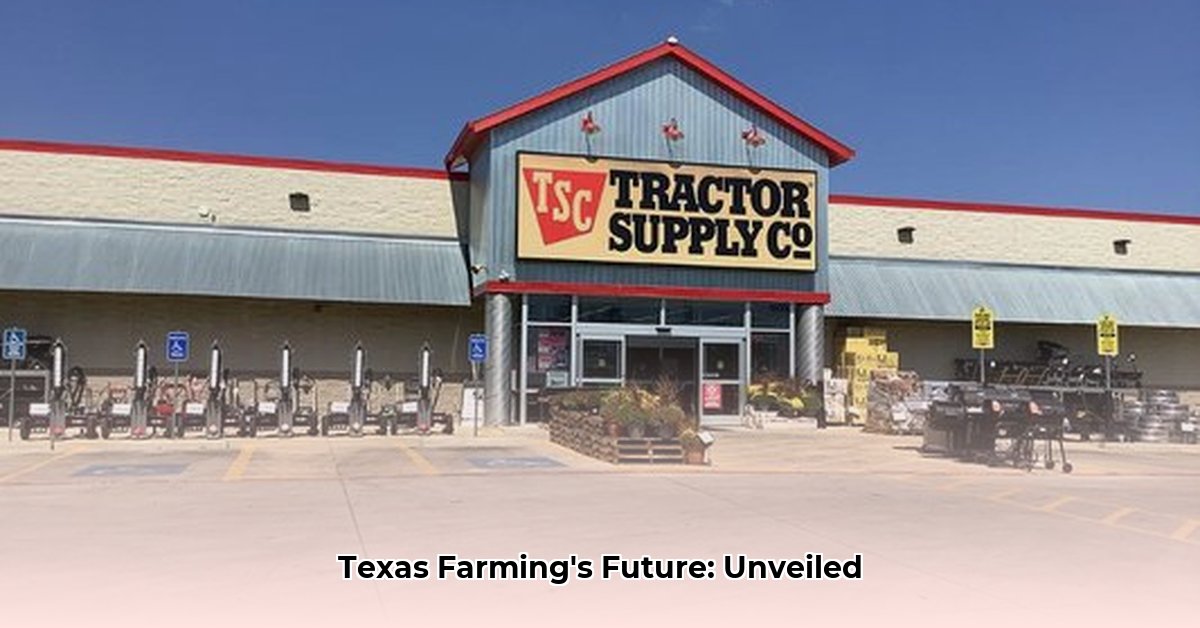
Tractor Supply Company (TSC) plays a pivotal role in the evolving landscape of Texas agriculture, increasingly focused on sustainable practices. This article analyzes TSC's contributions, challenges, and future potential within this vital sector. We examine their product range, evaluate their strengths and weaknesses, explore their sustainability efforts (or lack thereof), and offer recommendations for TSC, farmers, and consumers alike. The question remains: How effectively is TSC supporting—and how can it better support—the transition to sustainable agriculture in the Lone Star State? For more information on a local TSC, visit this Caldwell, Texas location.
Tractor Supply's Texas Reach: A Statewide Partner
TSC's extensive network of stores across Texas provides unparalleled accessibility for farmers of all scales, from large commercial operations to small family farms and even urban gardeners. This ubiquitous presence significantly impacts the availability of essential supplies, fostering agricultural productivity across the state. But is this reach truly translating into support for sustainable farming practices?
Products and Customers: A Diverse Ecosystem
TSC's product range is remarkably diverse, encompassing everything from seeds and fertilizers to livestock feed and heavy farm equipment. This broad inventory caters to a heterogeneous customer base, ranging from large-scale commercial farms to small-scale family farms and individual gardeners. This inclusivity is a strength, but does TSC's product selection adequately reflect the increasing demand for sustainable agricultural inputs?
TSC: Strengths, Weaknesses, and Opportunities
TSC possesses several key strengths in the Texas agricultural market:
- Extensive Store Network: TSC's widespread presence offers unparalleled convenience to farmers across the state.
- Local Expertise: Many TSC employees possess valuable knowledge of local farming conditions and can provide tailored advice.
- Product Diversity: The breadth and depth of TSC's inventory cater to the diverse needs of Texas farmers and gardeners.
However, TSC also faces significant challenges:
- Online Competition: Increasing competition from online retailers threatens TSC's market share.
- Supply Chain Vulnerabilities: Dependence on a physical store network exposes TSC to potential supply chain disruptions.
- Sustainability Transparency: TSC's commitment to sustainable practices lacks clear public communication and demonstrable action.
These challenges present significant opportunities for improvement and innovation.
Embracing Sustainability: A Path Forward for TSC
While TSC's current sustainability initiatives are not explicitly detailed publicly, several key areas present opportunities for improvement:
- Transparent Sourcing: Publicly disclosing the sourcing of products, emphasizing those produced using sustainable methods, would significantly enhance consumer trust.
- Sustainable Packaging: Shifting towards eco-friendly and recyclable packaging would minimize environmental impact and appeal to environmentally conscious customers.
- Efficient Transportation: Optimizing delivery routes and logistics could lead to reduced fuel consumption and a smaller carbon footprint.
- Strategic Partnerships: Collaborating with Texas-based sustainable agriculture organizations could enhance TSC's credibility and support its sustainability efforts.
The Future of TSC in Texas Agriculture: Adapting to Change
Texas agriculture is rapidly evolving, driven by technological advancements and increasing consumer demand for sustainably produced products. TSC must adapt to remain competitive:
- Enhanced E-commerce: Expanding online presence and capabilities is crucial to compete with online retailers and cater to changing consumer preferences.
- Promoting Sustainable Practices: Actively promoting sustainable products and educating customers on eco-friendly farming practices is vital.
- Investing in Staff Training: Equipping employees with in-depth knowledge of sustainable farming techniques is critical for effective customer support.
- Data-Driven Decisions: Utilizing data-driven strategies to assess impact and identify areas for improvement in efficiency and sustainability is crucial for long-term success.
A Collaborative Approach: Working Towards a Sustainable Future
The transition to sustainable agriculture in Texas necessitates a collaborative effort among all stakeholders:
Key Takeaways:
- TSC's widespread presence makes it a key player in the Texas sustainable agriculture landscape, yet its commitment requires enhancement.
- Farmers benefit from leveraging TSC's resources while advocating for stronger sustainability initiatives.
- Consumers can drive change by demanding greater transparency and sustainable product options.
- A concerted effort by all stakeholders is essential to foster a more sustainable Texas agricultural ecosystem.
The future of sustainable agriculture in Texas depends on a shared commitment to innovation and environmental responsibility. By proactively embracing change and working collaboratively, TSC can solidify its position as a valuable partner in building a more sustainable and prosperous future for Texas agriculture.